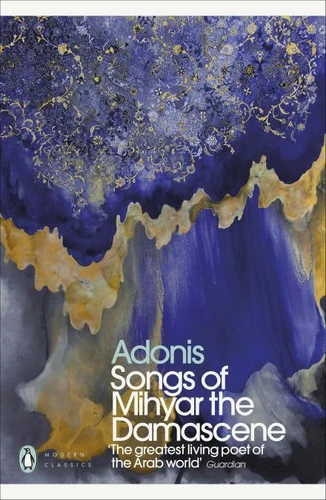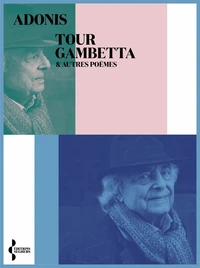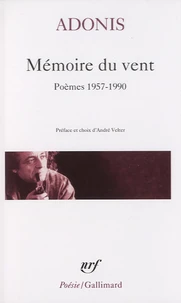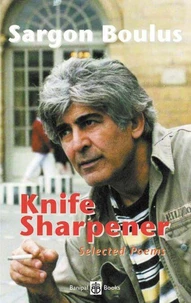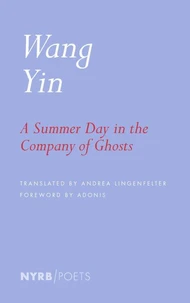Ali Ahmad Saïd Esber, d'origine rurale, est né le 1er janvier 1930 dans le village de Kassabine, en Syrie. Il prend à vingt ans le pseudonyme d'Adonis, lit Baudelaire, Rilke et, plus tard, Michaux, Char. Il choisit la nationalité libanaise en 1962. Sa poésie exprime les déchirements et les espoirs de la culture arabe contemporaine. Adonis vit à Paris depuis 1986.
Songs of Mihyar the Damascene
Par : , ,Formats :
Disponible dans votre compte client Decitre ou Furet du Nord dès validation de votre commande. Le format ePub protégé est :
- Compatible avec une lecture sur My Vivlio (smartphone, tablette, ordinateur)
- Compatible avec une lecture sur liseuses Vivlio
- Pour les liseuses autres que Vivlio, vous devez utiliser le logiciel Adobe Digital Edition. Non compatible avec la lecture sur les liseuses Kindle, Remarkable et Sony
- Non compatible avec un achat hors France métropolitaine
 , qui est-ce ?
, qui est-ce ?Notre partenaire de plateforme de lecture numérique où vous retrouverez l'ensemble de vos ebooks gratuitement
Pour en savoir plus sur nos ebooks, consultez notre aide en ligne ici
- Nombre de pages256
- FormatePub
- ISBN978-0-241-48356-5
- EAN9780241483565
- Date de parution25/02/2021
- Protection num.Adobe DRM
- Infos supplémentairesepub
- ÉditeurPENGUIN
Résumé
'The greatest living poet of the Arab world' GuardianCloud, mirror, stone, thunder, eyelid, desert, sea. Through a dead or dying land, Mihyar walks: a figure of heroic individualism and dissent, part-Orpheus, part-Zarathustra. Where he goes, the austere building-blocks of his world become the expressions of passionate emotion, of visionary exaltation and despairing melancholy. The traditions of the Ancient Greeks, the Bible and the Quran flow about and through him.
Written in the cosmopolitan Beirut of the early 1960s, Adonis's Songs of Mihyar the Damascene did for Arabic poetry what The Waste Land did for English. These are poems against authoritarianism and dogma, in which a new Noah would abandon his ark to dive with the condemned, and in which surrealism and Sufi mysticism meet and intertwine. The result is a masterpiece of world literature. Translated by Kareem James Abu Zeid and Ivan Eubanks'The most eloquent spokesman and explorer of Arabic modernity' Edward Said
Written in the cosmopolitan Beirut of the early 1960s, Adonis's Songs of Mihyar the Damascene did for Arabic poetry what The Waste Land did for English. These are poems against authoritarianism and dogma, in which a new Noah would abandon his ark to dive with the condemned, and in which surrealism and Sufi mysticism meet and intertwine. The result is a masterpiece of world literature. Translated by Kareem James Abu Zeid and Ivan Eubanks'The most eloquent spokesman and explorer of Arabic modernity' Edward Said
'The greatest living poet of the Arab world' GuardianCloud, mirror, stone, thunder, eyelid, desert, sea. Through a dead or dying land, Mihyar walks: a figure of heroic individualism and dissent, part-Orpheus, part-Zarathustra. Where he goes, the austere building-blocks of his world become the expressions of passionate emotion, of visionary exaltation and despairing melancholy. The traditions of the Ancient Greeks, the Bible and the Quran flow about and through him.
Written in the cosmopolitan Beirut of the early 1960s, Adonis's Songs of Mihyar the Damascene did for Arabic poetry what The Waste Land did for English. These are poems against authoritarianism and dogma, in which a new Noah would abandon his ark to dive with the condemned, and in which surrealism and Sufi mysticism meet and intertwine. The result is a masterpiece of world literature. Translated by Kareem James Abu Zeid and Ivan Eubanks'The most eloquent spokesman and explorer of Arabic modernity' Edward Said
Written in the cosmopolitan Beirut of the early 1960s, Adonis's Songs of Mihyar the Damascene did for Arabic poetry what The Waste Land did for English. These are poems against authoritarianism and dogma, in which a new Noah would abandon his ark to dive with the condemned, and in which surrealism and Sufi mysticism meet and intertwine. The result is a masterpiece of world literature. Translated by Kareem James Abu Zeid and Ivan Eubanks'The most eloquent spokesman and explorer of Arabic modernity' Edward Said

